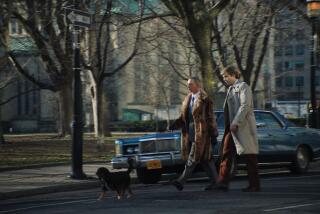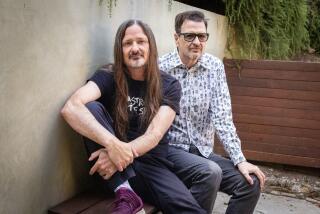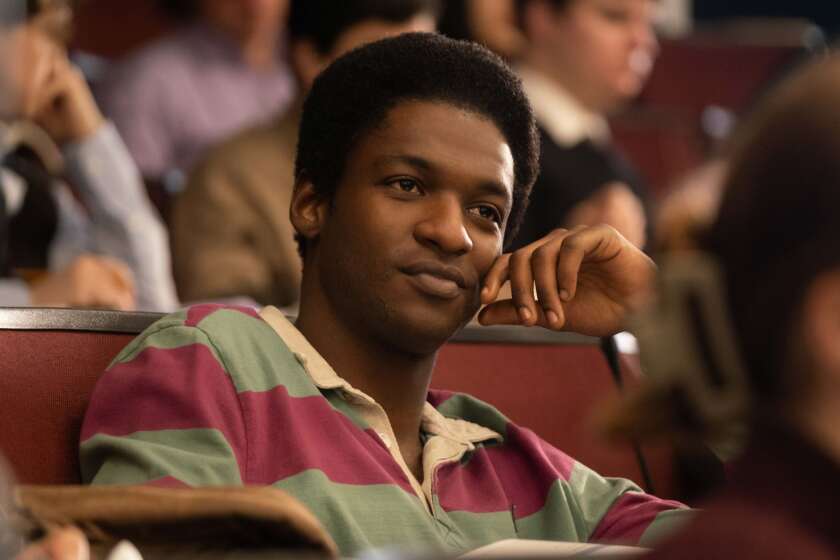Review: Michael Keaton reveals the face of American greed in the shrewd McDonald’s drama ‘The Founder’

Justin Chang reviews “The Founder,” directed by John Lee Hancock and starring Michael Keaton. Video by Jason H. Neubert.
“What have you ever come up with?!” That question arrives near the end of “The Founder,” a sharp and satisfyingly fat-free account of how a wily salesman took a lucrative Southern California burger joint and turned it into the world’s biggest fast-food empire. Given what we’ve seen up until that point — a reluctant deal with the devil that has all but pushed two hardworking brothers out of their own company — it’s a reasonable enough inquiry.
You might well be reminded of a similarly scornful question (“What do you do?!”) posed in another recent biopic of a much more iconic American entrepreneur. In each film it’s implied that the man in charge — Steve Jobs of Apple, Ray Kroc of McDonald’s — is little more than a glorified parasite, a corporate maverick with a genius for seizing, amplifying and profiting from the contributions of his more talented, more principled underlings.
Jobs and Kroc were, of course, very different people and businessmen, and “Steve Jobs” and “The Founder” are accordingly distinct movies. Sturdily directed by John Lee Hancock from a shrewd script by Robert Siegel, “The Founder” moves briskly and assuredly from one well-constructed scene to the next, propelled by currents of dialogue that, while barbed and engaging, have none of Aaron Sorkin’s hyper-articulate verbal fireworks.
What the two movies do have in common — with each other, and with another Sorkin-scripted drama, “The Social Network” — is a fascination with a powerfully disruptive moment in American commerce. They also prove more than willing to defy the traditional, often tedious dramatic logic that a protagonist — particularly one based on a real-life person — must be an inherently heroic or likable figure.
That’s not to suggest that we feel nothing for Kroc, who is played with alternately ratty and reptilian intelligence by Michael Keaton — an actor too generous, and too instinctively fair-minded, not to imbue even his most unsavory alter egos with at least a glimmer of soul.
When we first meet Kroc in 1954, wearily hawking milkshake machines at drive-in diners across the heartland, we’re impressed by the practiced fluency of his sales pitch even as we sense the corroded spirit behind it; the trappings of personal failure and disappointment are as unmistakable and overpowering as the smell of fry grease.
But when Kroc hears about McDonald’s Hamburgers, a restaurant out in San Bernardino that has become an overnight sensation, he makes the long drive west to meet Richard “Dick” McDonald (Nick Offerman) and Maurice “Mac” McDonald (John Carroll Lynch). The brothers happily explain how they tossed out the problematic drive-in model and introduced the kind of speed, consistency and convenience — all-paper packaging, a mechanized system of production and assembly — that we have long since come to associate with not just the McDonald’s brand, but the fast-food industry in general.
The flashback-heavy sequence that brings all this together — tightly edited by Robert Frazen, in rhythm with the McDonald’s employees’ own clockwork-precise movements — is a small masterpiece of narrative compression. It’s also a deceptively optimistic tribute to American innovation in action. You might not emerge from “The Founder” craving a hamburger with a machine-tooled distribution of onions, pickles, ketchup and mustard but you can’t help but admire the skill and ingenuity with which it all comes together.
Something similar might be said of “The Founder,” whose sneaky brilliance lies in its tonal control, its way of calling our own sympathies and ideals into question. At every step the movie honors the McDonald brothers’ decency and humility, their heroic commitment to ensuring quality at their flagship San Bernardino location. (Lynch and Offerman’s good-bro-bad-bro routine is a delight.) But it also allows us to appreciate Kroc’s thrilling, enormous vision of those heavenly Golden Arches stretching from coast to coast. Finally winning over the brothers, he tells them, “Do it for America.”
Hancock traces the fallout of this Faustian bargain with impressive nuance, clarity and a rigorous attention to the sort of procedural minutiae — the laws and loopholes of franchise real estate, the moral and logistical implications of a powdered milkshake — that might have bogged down a less assured telling. In doing so, he turns the unlikely subject of a fast-food chain into a quasi-religious satire, a parable of American striving and, ultimately, a study of artisanal integrity gradually caving in to commercial compromise.
That tension was also at the heart of Hancock’s previous film, “Saving Mr. Banks,” an under-appreciated comic portrait of the author P.L. Travers and her battle with Walt Disney for the soul of Mary Poppins. Like that movie, “The Founder” bolsters its leads with several perfectly calibrated supporting performances, including from B.J. Novak as Harry Sonneborn, the finance whiz who would eventually become McDonald’s Corp.’s first president and CEO, and Linda Cardellini as Joan Smith, a business associate whose seductive ruthlessness turns out to match Kroc’s own. Best of all is Laura Dern, tamping down her natural radiance and letting a silent tragedy play out in the face of Kroc’s long-neglected wife, Ethel.
One of the smoothest, most reliable craftsmen now working in Hollywood, Hancock has a particular feel for smart, uncondescending stories set in the American heartland (as does Siegel, who wrote the scripts for “The Wrestler” and “Big Fan”). He also brings to the table a subtly sardonic attitude that helps cut through the sentimentalism that creeps in around the edges of his movies, including “The Rookie” and “The Blind Side.”
That attitude is especially pronounced in “The Founder,” as evidenced by Carter Burwell’s moody, jaundiced score, and by the work of the cinematographer John Schwartzman, who often favors long shots over closeups — a tactic that especially suits the movie’s visual tribute to the heyday of the American drive-in diner, as well as its grim montages of identical-looking McDonald’s locations opening in state after state, city after city.
“The Founder” isn’t a McDonald’s takedown in the manner of, say, Morgan Spurlock’s documentary “Super Size Me”; it is, on one level, an elegy for what the company might have been, but it’s also wise enough to know that McDonald’s is interesting only because of what it became. Not without reason, many will interpret the movie as a timely study in Trumpian decadence, the story of an unprincipled self-made businessman trampling over a nation’s higher ideals.
I myself couldn’t help but wonder if the movie struck a particularly resonant chord with executive producers Bob and Harvey Weinstein, two empire builders who know firsthand what it feels like to have a family-branded company taken away from them. I also had to marvel at the irony that a movie about the challenges of promotion and distribution has, until now, been so clumsily mishandled in those departments — up to and including the Weinstein Co.’s decision, after months of repositioning “The Founder” on its 2016 release calendar, to move up its Oscar-qualifying run at the last minute.
The film is now playing for a week at Arclight Cinemas in Hollywood, and will open wide on Jan. 20. Whether you see it now or later, it’s a tastier, more nourishing meal than the packaging implies.
------------
‘The Founder’
MPAA rating: PG-13, for brief strong language
Running time: 1 hour, 55 minutes
Playing: Arclight Cinemas, Hollywood
See the most-read stories in Entertainment this hour »
Movie Trailers
More to Read
Only good movies
Get the Indie Focus newsletter, Mark Olsen's weekly guide to the world of cinema.
You may occasionally receive promotional content from the Los Angeles Times.











